Opportunities and Threats for SMEs in the International Market
VerifiedAdded on 2024/07/12
|14
|715
|343
Presentation
AI Summary
This presentation analyzes the global business environment for Small and Medium Enterprises (SMEs), highlighting the opportunities and threats they face in the international market. It discusses how globalization presents both growth potential and risks, particularly concerning asset constraints and funding limitations. The presentation identifies threats such as high interest rates, inflation, business continuity challenges, and the impact of events like Brexit. Opportunities for SMEs include growth, productivity gains, and access to new markets. It further explains trading blocs and their benefits, along with tariff and non-tariff barriers like preferential duties, quotas, and embargoes. The presentation concludes by emphasizing the importance of understanding import and export restrictions for SMEs venturing into the global market.
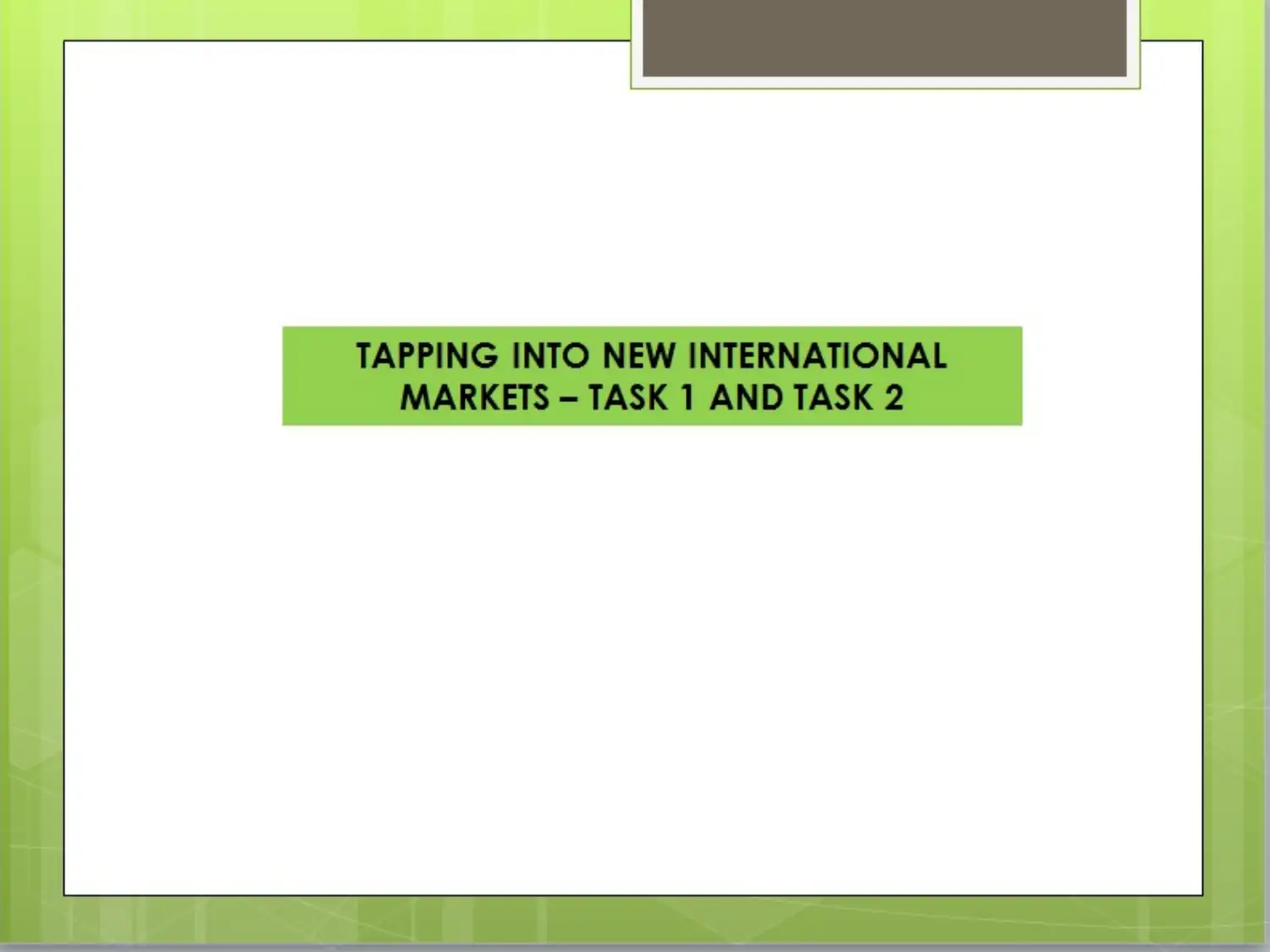
Paraphrase This Document
Need a fresh take? Get an instant paraphrase of this document with our AI Paraphraser
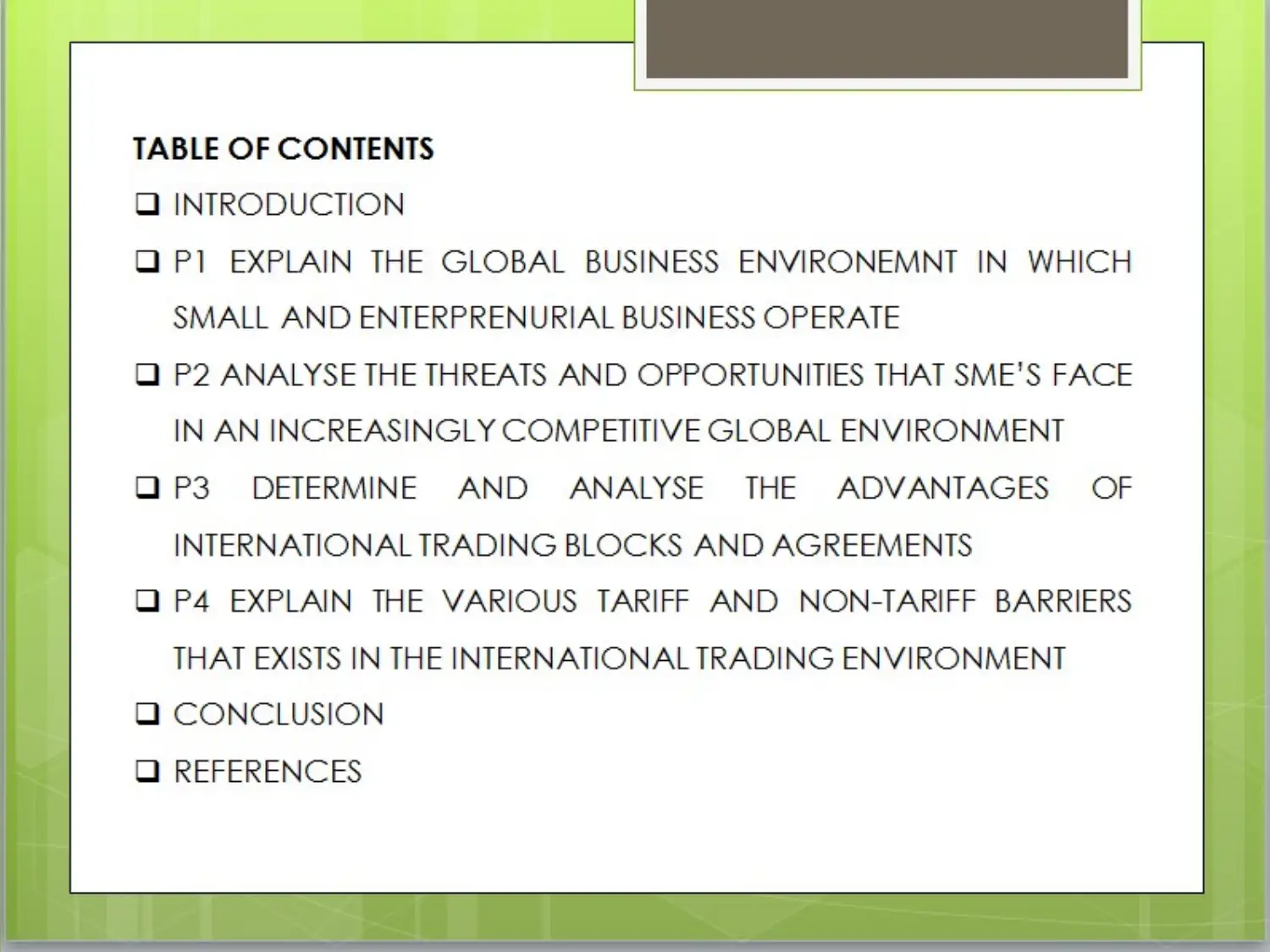
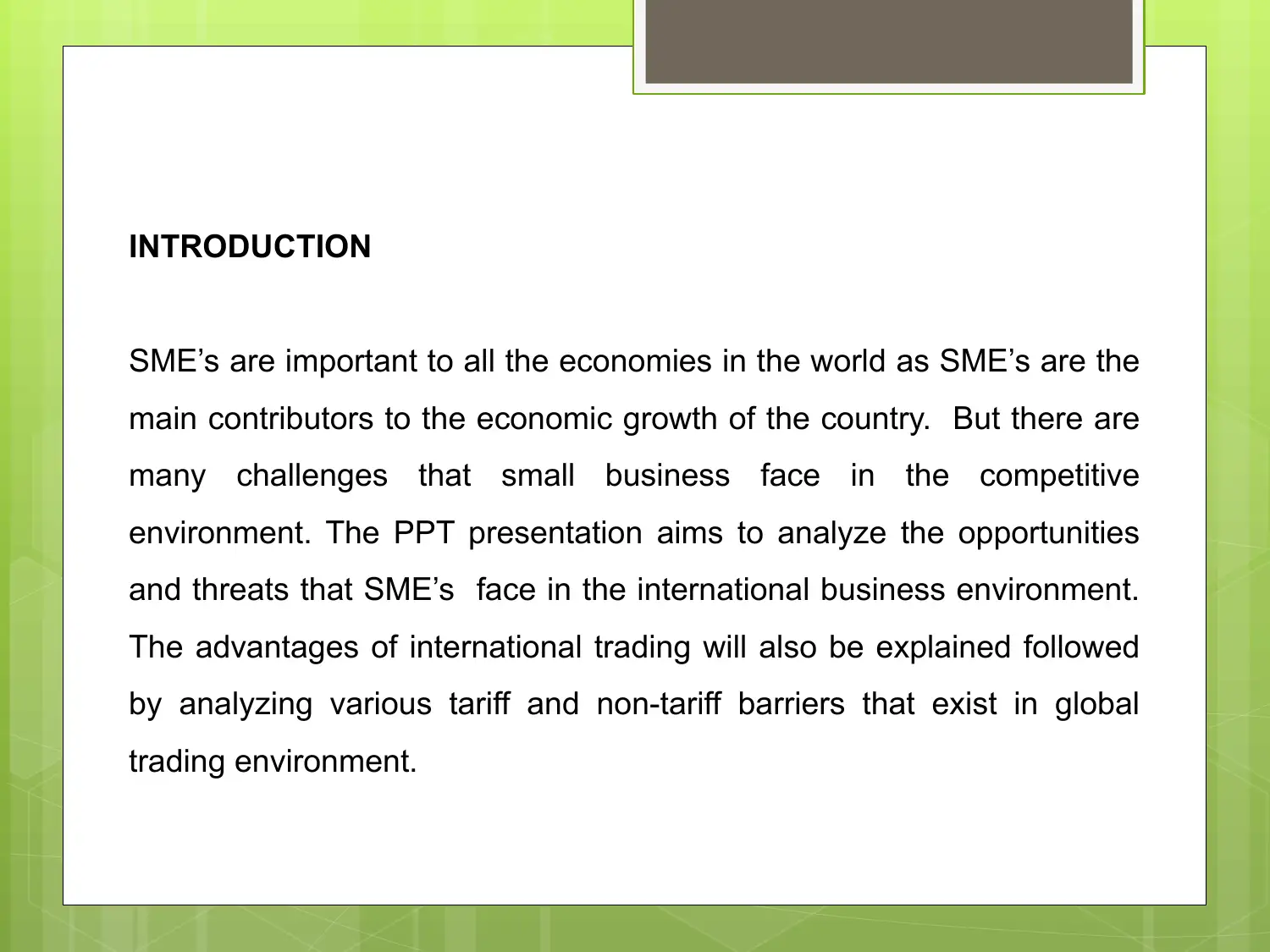
INTRODUCTION
SME’s are important to all the economies in the world as SME’s are the
main contributors to the economic growth of the country. But there are
many challenges that small business face in the competitive
environment. The PPT presentation aims to analyze the opportunities
and threats that SME’s face in the international business environment.
The advantages of international trading will also be explained followed
by analyzing various tariff and non-tariff barriers that exist in global
trading environment.
SME’s are important to all the economies in the world as SME’s are the
main contributors to the economic growth of the country. But there are
many challenges that small business face in the competitive
environment. The PPT presentation aims to analyze the opportunities
and threats that SME’s face in the international business environment.
The advantages of international trading will also be explained followed
by analyzing various tariff and non-tariff barriers that exist in global
trading environment.
⊘ This is a preview!⊘
Do you want full access?
Subscribe today to unlock all pages.

Trusted by 1+ million students worldwide
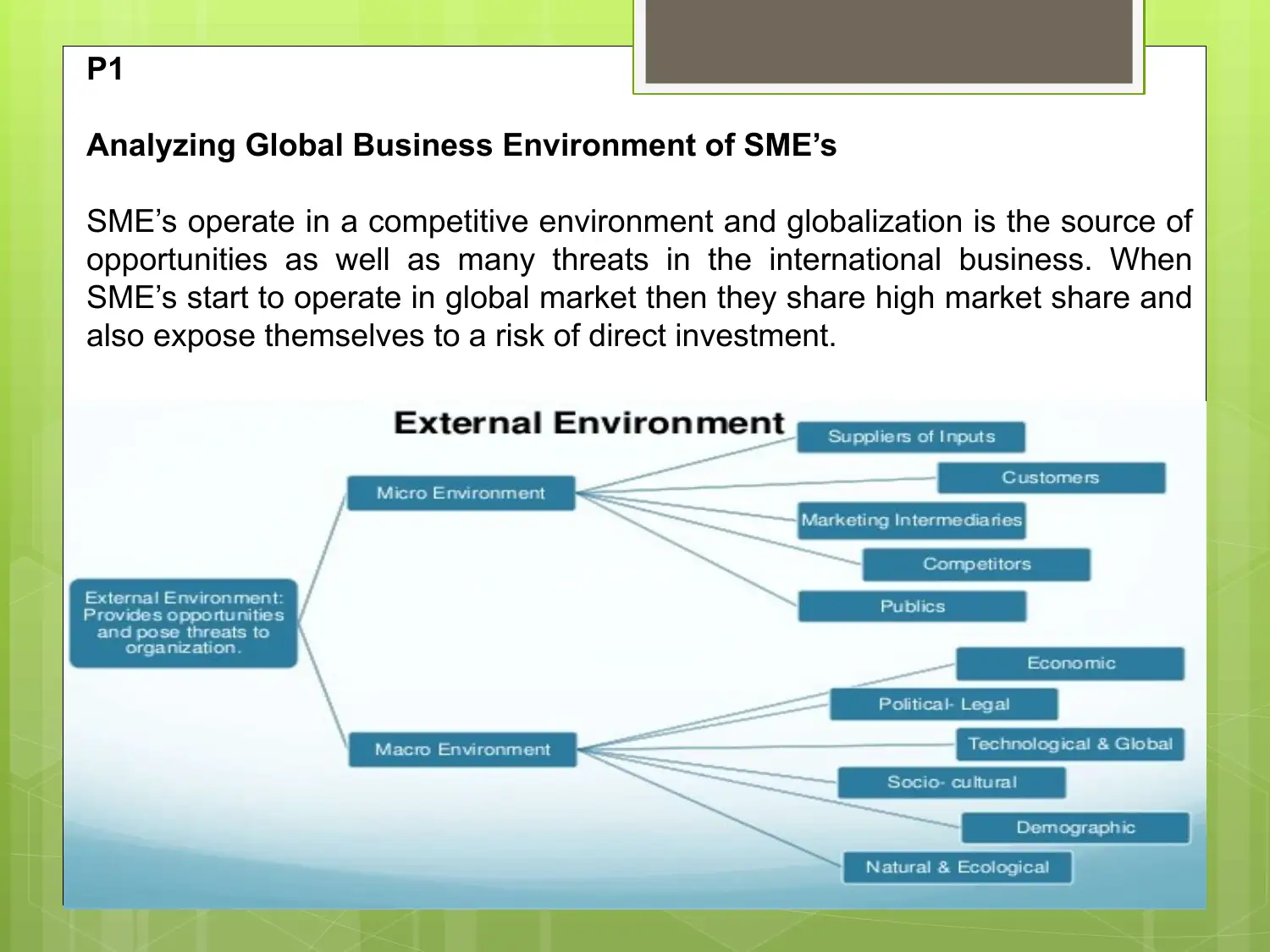
P1
Analyzing Global Business Environment of SME’s
SME’s operate in a competitive environment and globalization is the source of
opportunities as well as many threats in the international business. When
SME’s start to operate in global market then they share high market share and
also expose themselves to a risk of direct investment.
Analyzing Global Business Environment of SME’s
SME’s operate in a competitive environment and globalization is the source of
opportunities as well as many threats in the international business. When
SME’s start to operate in global market then they share high market share and
also expose themselves to a risk of direct investment.
Paraphrase This Document
Need a fresh take? Get an instant paraphrase of this document with our AI Paraphraser
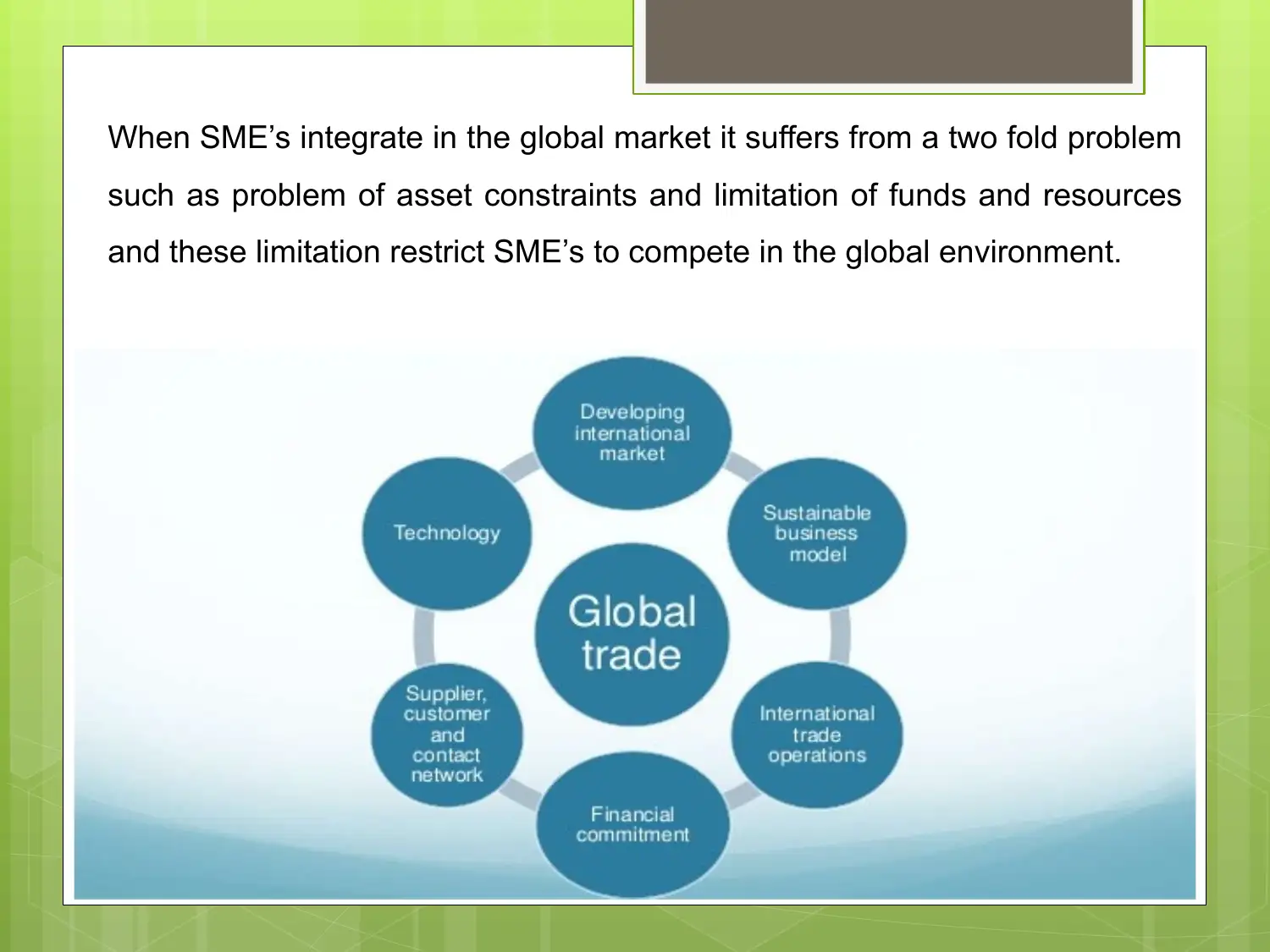
When SME’s integrate in the global market it suffers from a two fold problem
such as problem of asset constraints and limitation of funds and resources
and these limitation restrict SME’s to compete in the global environment.
such as problem of asset constraints and limitation of funds and resources
and these limitation restrict SME’s to compete in the global environment.
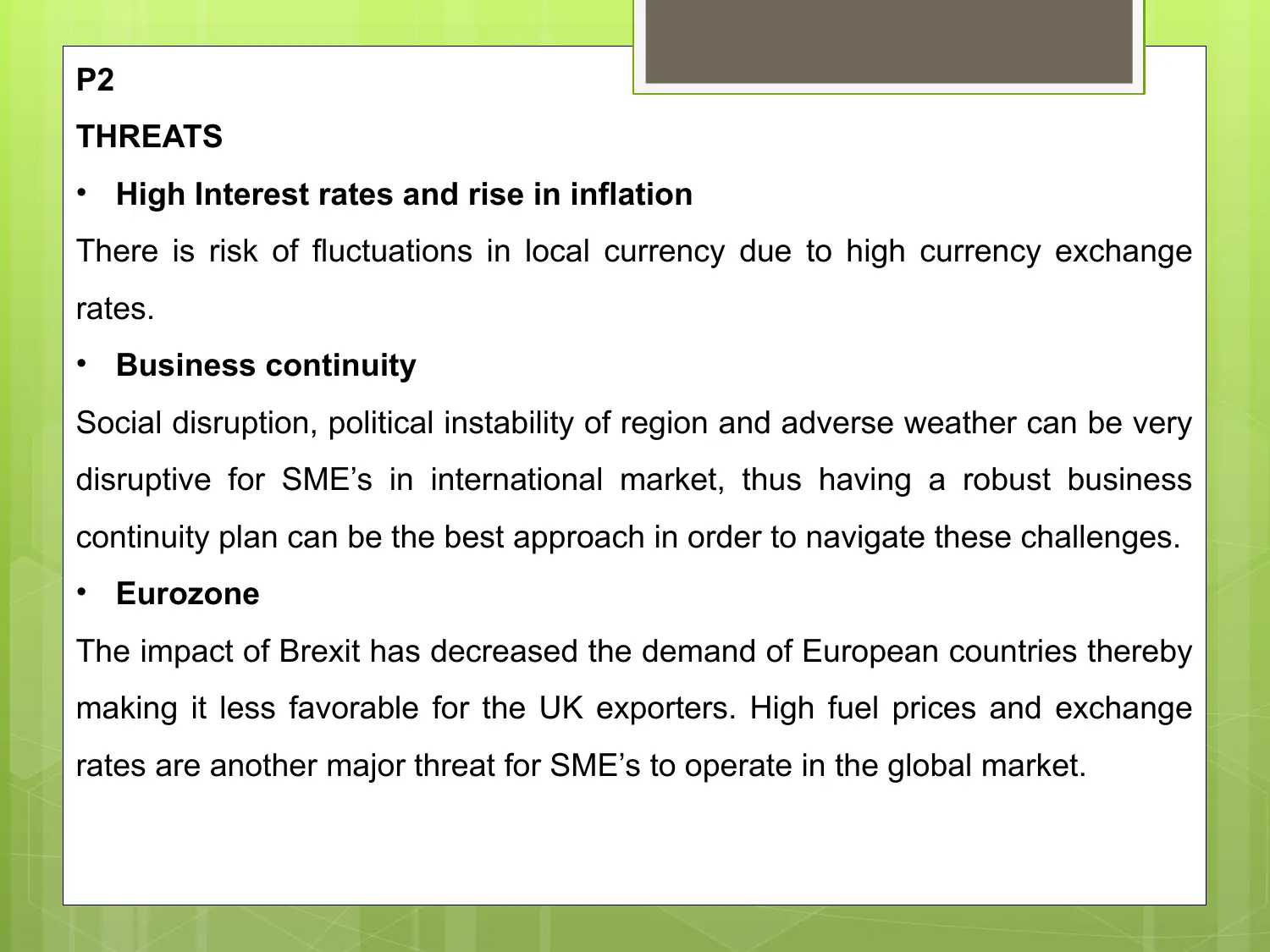
P2
THREATS
• High Interest rates and rise in inflation
There is risk of fluctuations in local currency due to high currency exchange
rates.
• Business continuity
Social disruption, political instability of region and adverse weather can be very
disruptive for SME’s in international market, thus having a robust business
continuity plan can be the best approach in order to navigate these challenges.
• Eurozone
The impact of Brexit has decreased the demand of European countries thereby
making it less favorable for the UK exporters. High fuel prices and exchange
rates are another major threat for SME’s to operate in the global market.
THREATS
• High Interest rates and rise in inflation
There is risk of fluctuations in local currency due to high currency exchange
rates.
• Business continuity
Social disruption, political instability of region and adverse weather can be very
disruptive for SME’s in international market, thus having a robust business
continuity plan can be the best approach in order to navigate these challenges.
• Eurozone
The impact of Brexit has decreased the demand of European countries thereby
making it less favorable for the UK exporters. High fuel prices and exchange
rates are another major threat for SME’s to operate in the global market.
⊘ This is a preview!⊘
Do you want full access?
Subscribe today to unlock all pages.

Trusted by 1+ million students worldwide
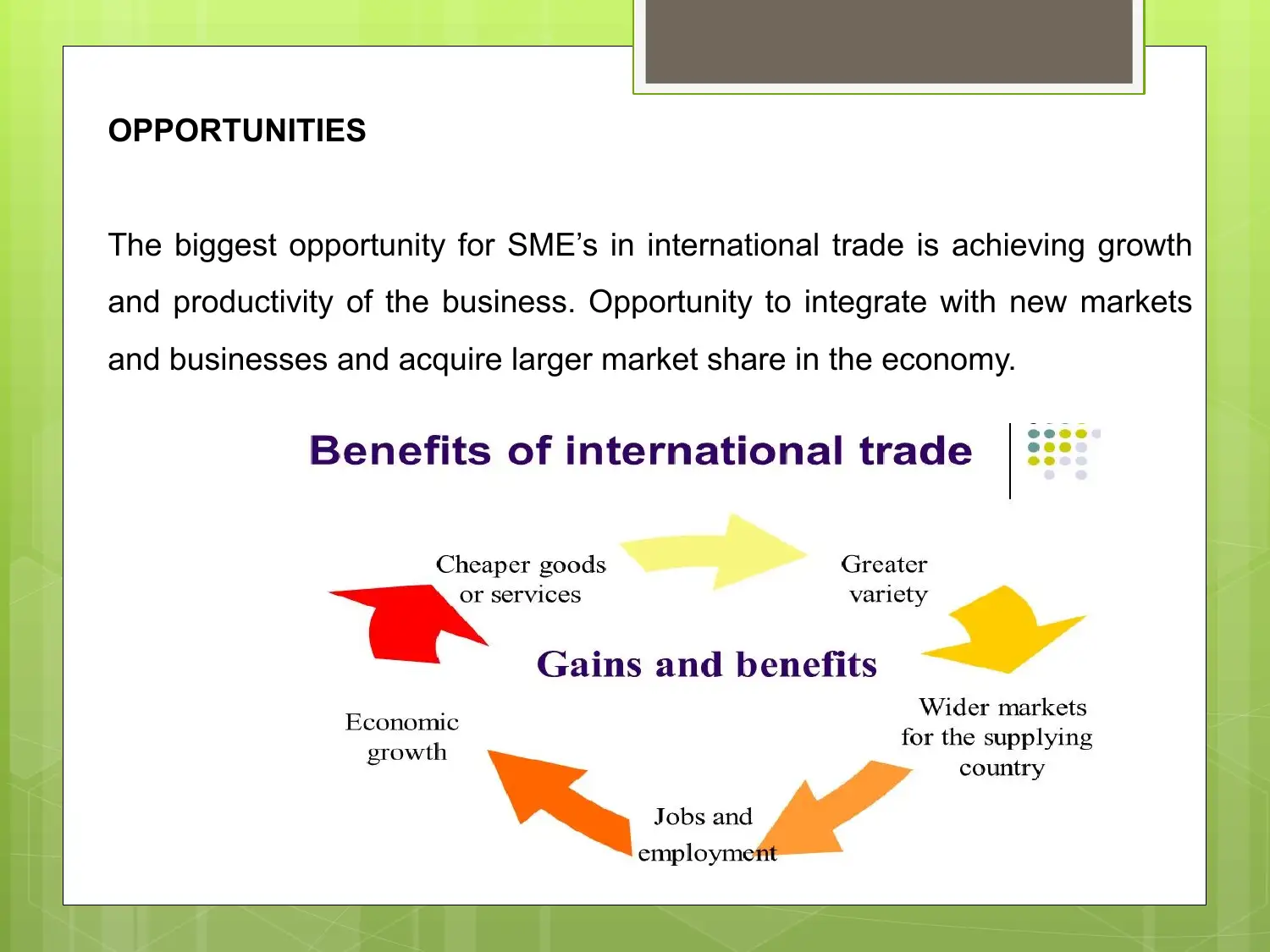
OPPORTUNITIES
The biggest opportunity for SME’s in international trade is achieving growth
and productivity of the business. Opportunity to integrate with new markets
and businesses and acquire larger market share in the economy.
The biggest opportunity for SME’s in international trade is achieving growth
and productivity of the business. Opportunity to integrate with new markets
and businesses and acquire larger market share in the economy.
Paraphrase This Document
Need a fresh take? Get an instant paraphrase of this document with our AI Paraphraser
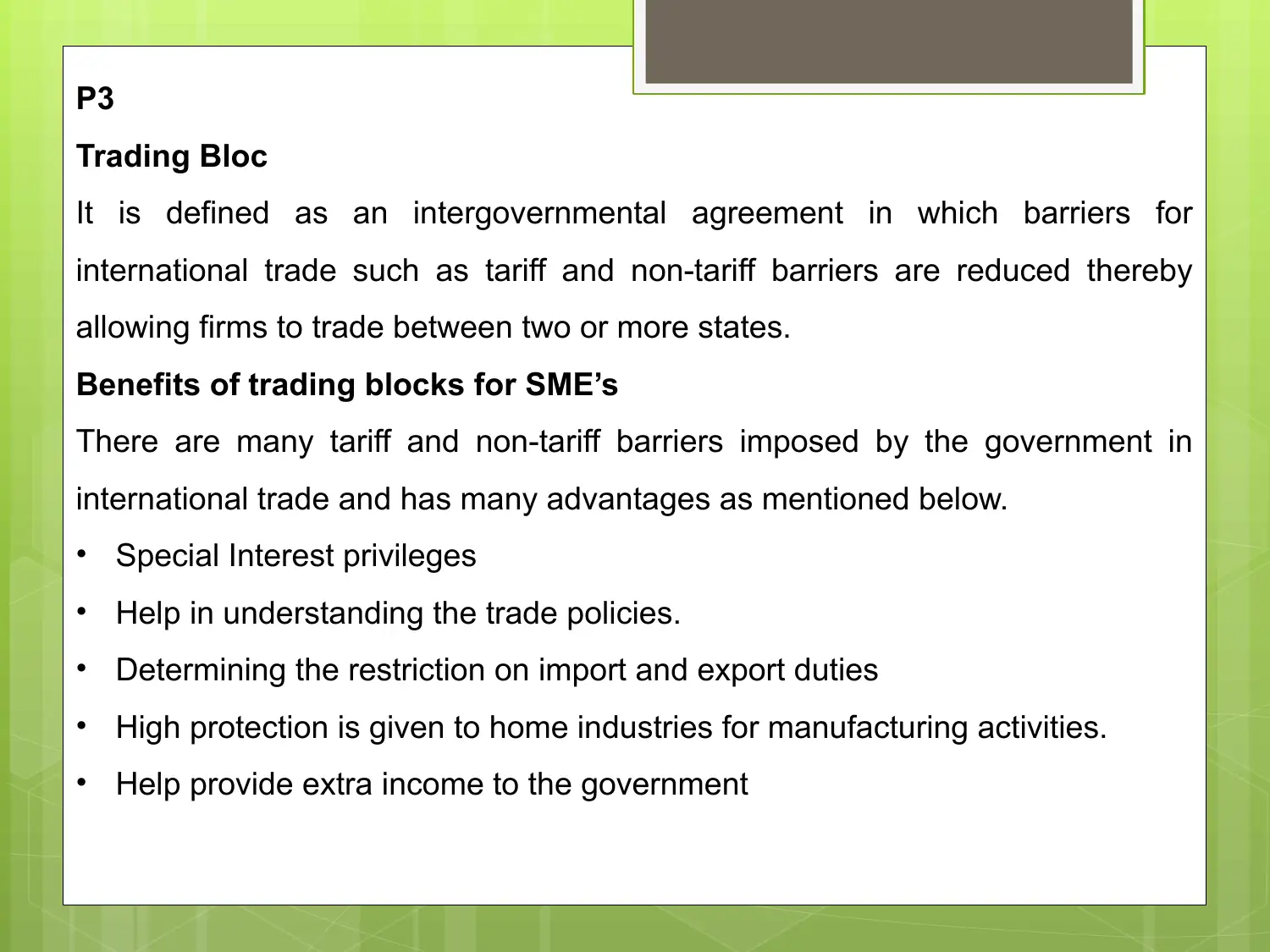
P3
Trading Bloc
It is defined as an intergovernmental agreement in which barriers for
international trade such as tariff and non-tariff barriers are reduced thereby
allowing firms to trade between two or more states.
Benefits of trading blocks for SME’s
There are many tariff and non-tariff barriers imposed by the government in
international trade and has many advantages as mentioned below.
• Special Interest privileges
• Help in understanding the trade policies.
• Determining the restriction on import and export duties
• High protection is given to home industries for manufacturing activities.
• Help provide extra income to the government
Trading Bloc
It is defined as an intergovernmental agreement in which barriers for
international trade such as tariff and non-tariff barriers are reduced thereby
allowing firms to trade between two or more states.
Benefits of trading blocks for SME’s
There are many tariff and non-tariff barriers imposed by the government in
international trade and has many advantages as mentioned below.
• Special Interest privileges
• Help in understanding the trade policies.
• Determining the restriction on import and export duties
• High protection is given to home industries for manufacturing activities.
• Help provide extra income to the government
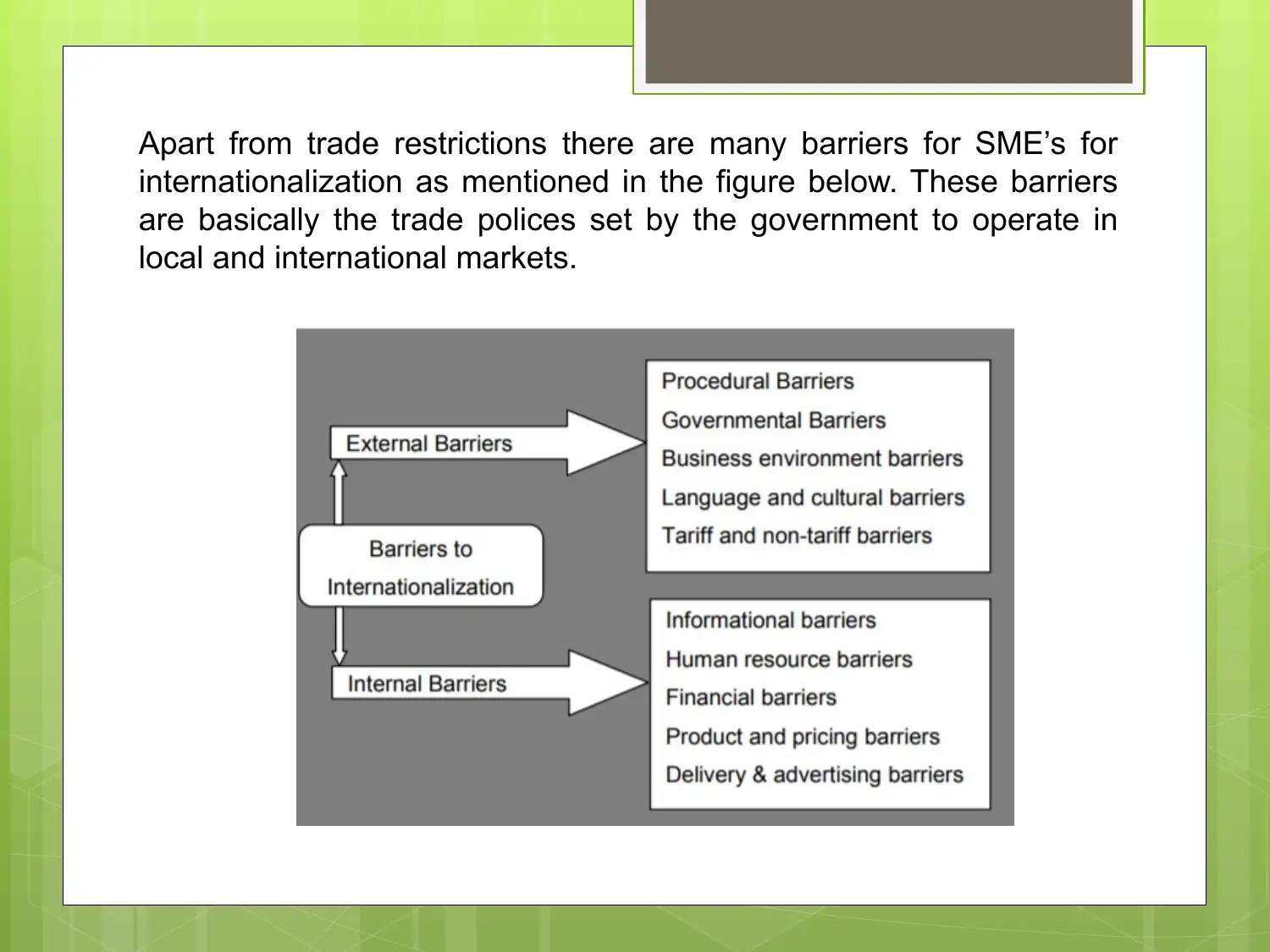
Apart from trade restrictions there are many barriers for SME’s for
internationalization as mentioned in the figure below. These barriers
are basically the trade polices set by the government to operate in
local and international markets.
internationalization as mentioned in the figure below. These barriers
are basically the trade polices set by the government to operate in
local and international markets.
⊘ This is a preview!⊘
Do you want full access?
Subscribe today to unlock all pages.

Trusted by 1+ million students worldwide
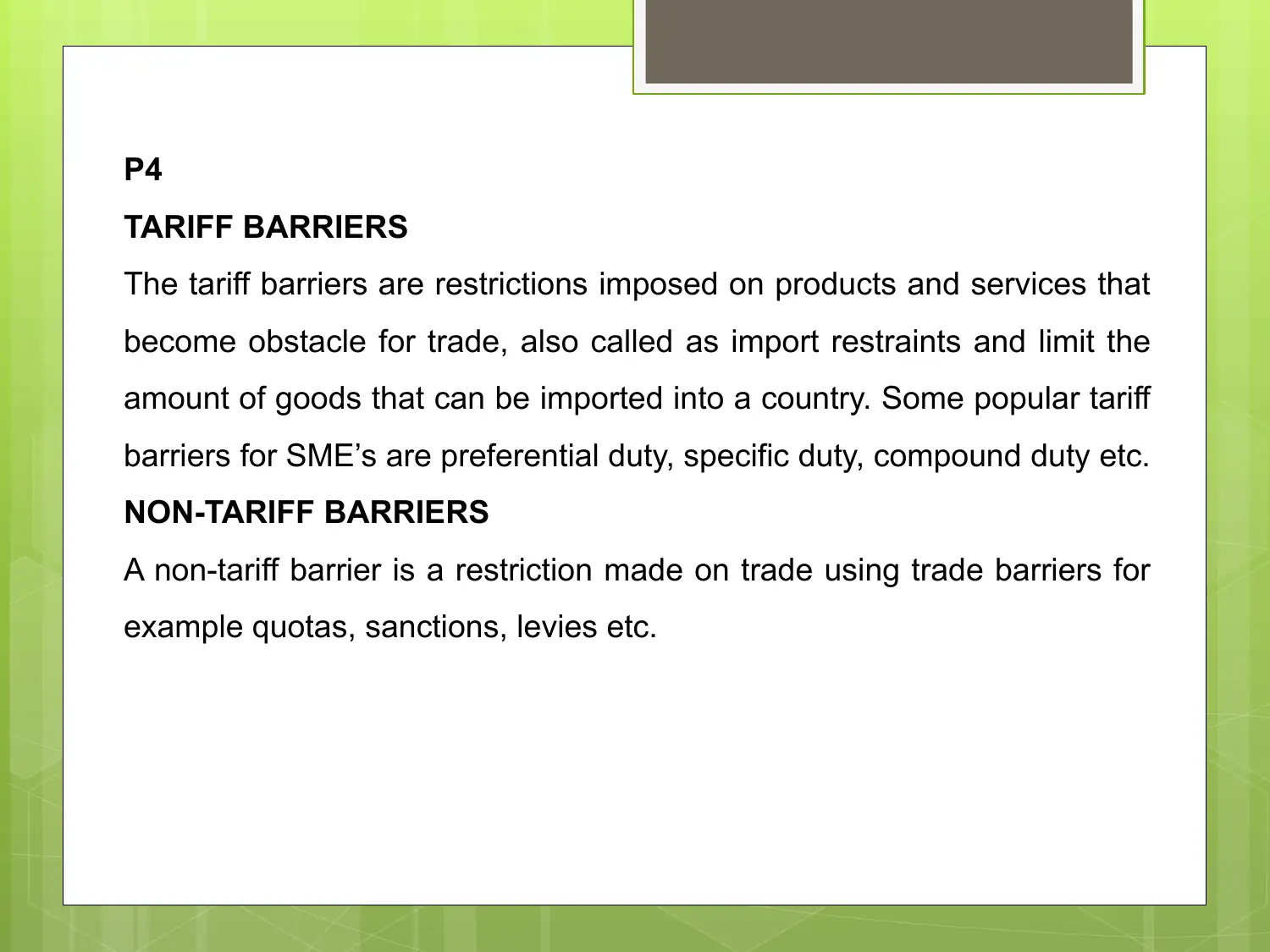
P4
TARIFF BARRIERS
The tariff barriers are restrictions imposed on products and services that
become obstacle for trade, also called as import restraints and limit the
amount of goods that can be imported into a country. Some popular tariff
barriers for SME’s are preferential duty, specific duty, compound duty etc.
NON-TARIFF BARRIERS
A non-tariff barrier is a restriction made on trade using trade barriers for
example quotas, sanctions, levies etc.
TARIFF BARRIERS
The tariff barriers are restrictions imposed on products and services that
become obstacle for trade, also called as import restraints and limit the
amount of goods that can be imported into a country. Some popular tariff
barriers for SME’s are preferential duty, specific duty, compound duty etc.
NON-TARIFF BARRIERS
A non-tariff barrier is a restriction made on trade using trade barriers for
example quotas, sanctions, levies etc.
Paraphrase This Document
Need a fresh take? Get an instant paraphrase of this document with our AI Paraphraser
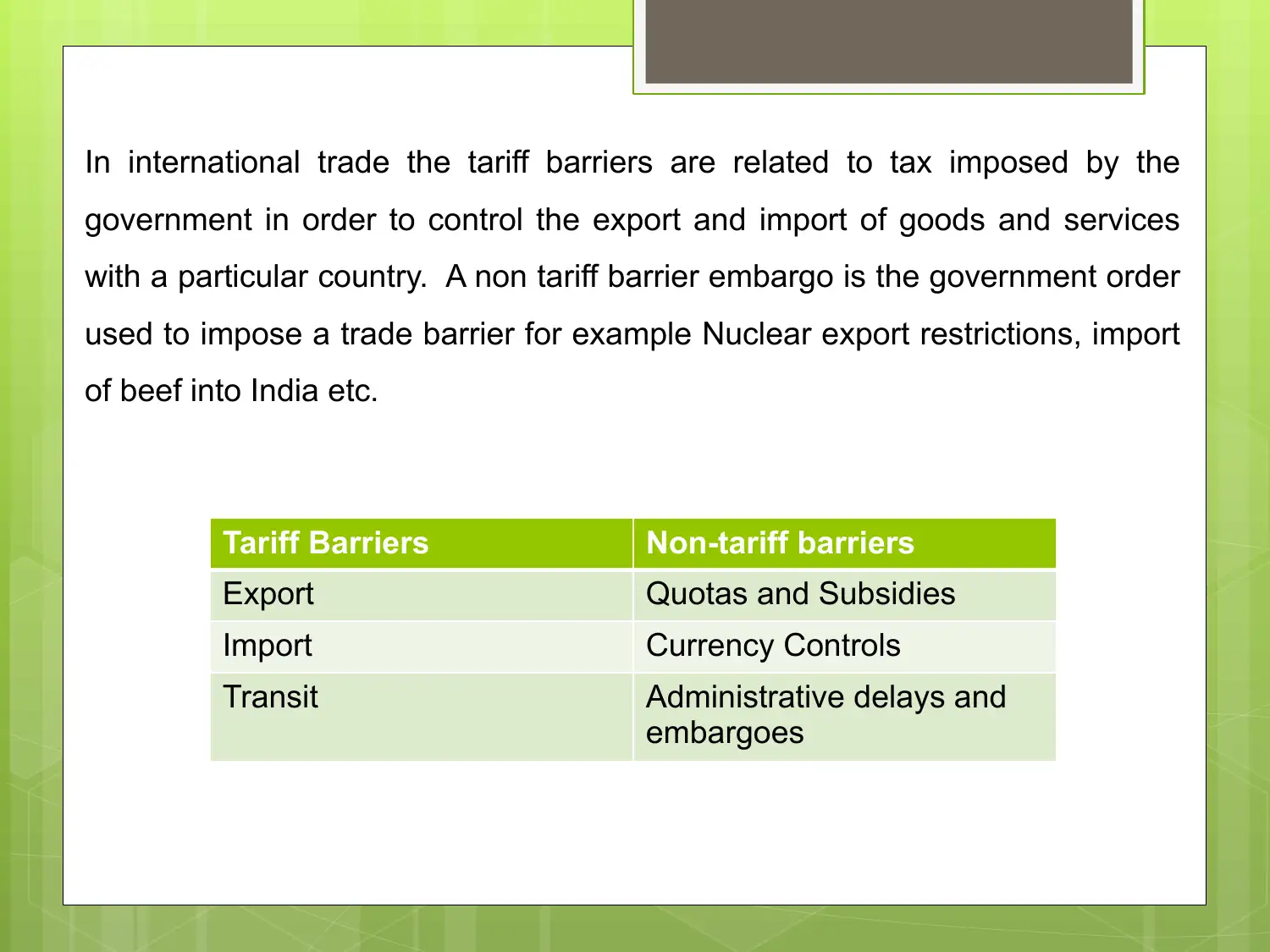
In international trade the tariff barriers are related to tax imposed by the
government in order to control the export and import of goods and services
with a particular country. A non tariff barrier embargo is the government order
used to impose a trade barrier for example Nuclear export restrictions, import
of beef into India etc.
Tariff Barriers Non-tariff barriers
Export Quotas and Subsidies
Import Currency Controls
Transit Administrative delays and
embargoes
government in order to control the export and import of goods and services
with a particular country. A non tariff barrier embargo is the government order
used to impose a trade barrier for example Nuclear export restrictions, import
of beef into India etc.
Tariff Barriers Non-tariff barriers
Export Quotas and Subsidies
Import Currency Controls
Transit Administrative delays and
embargoes
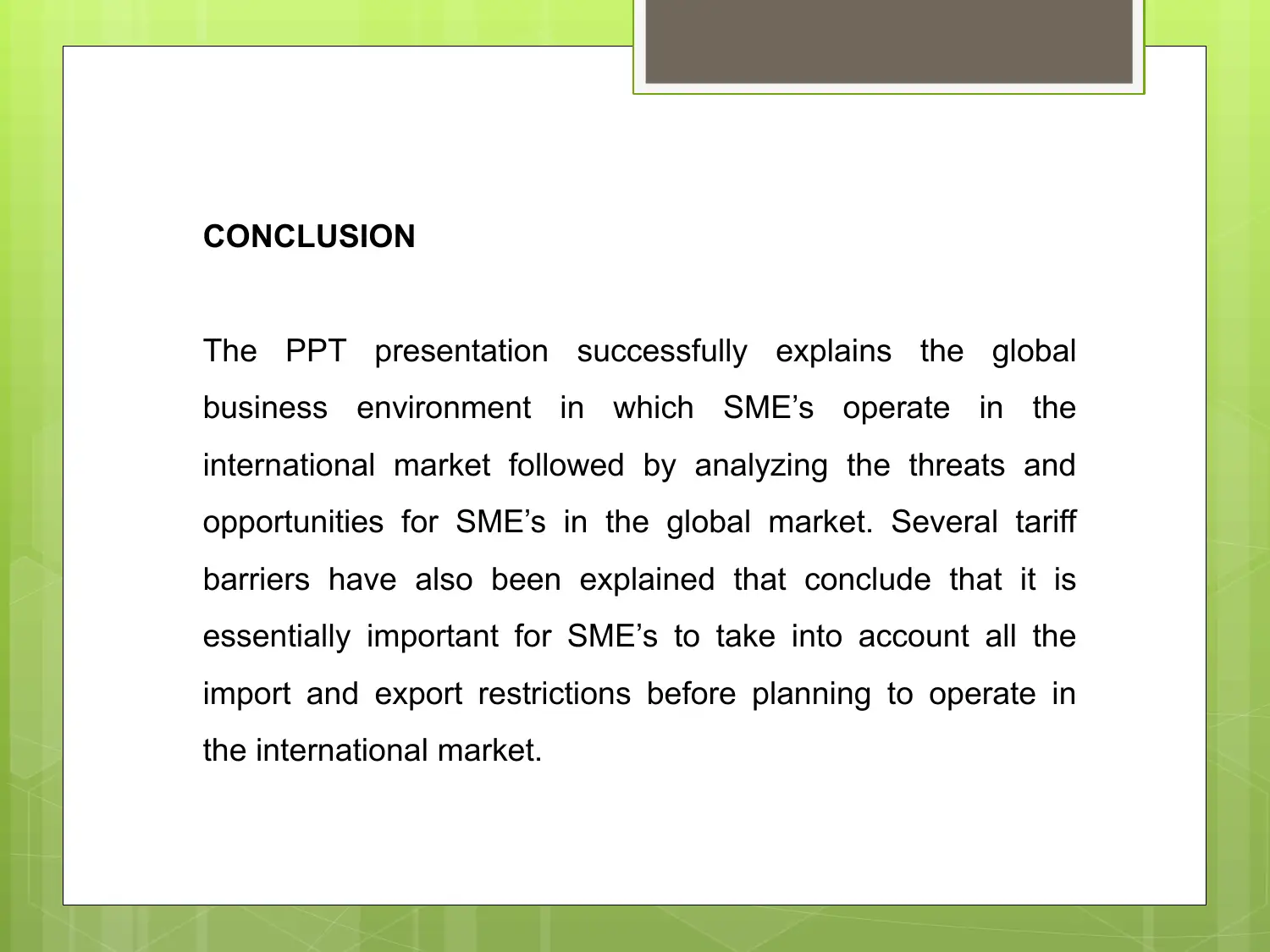
CONCLUSION
The PPT presentation successfully explains the global
business environment in which SME’s operate in the
international market followed by analyzing the threats and
opportunities for SME’s in the global market. Several tariff
barriers have also been explained that conclude that it is
essentially important for SME’s to take into account all the
import and export restrictions before planning to operate in
the international market.
The PPT presentation successfully explains the global
business environment in which SME’s operate in the
international market followed by analyzing the threats and
opportunities for SME’s in the global market. Several tariff
barriers have also been explained that conclude that it is
essentially important for SME’s to take into account all the
import and export restrictions before planning to operate in
the international market.
⊘ This is a preview!⊘
Do you want full access?
Subscribe today to unlock all pages.

Trusted by 1+ million students worldwide
1 out of 14
Related Documents
Your All-in-One AI-Powered Toolkit for Academic Success.
+13062052269
info@desklib.com
Available 24*7 on WhatsApp / Email
![[object Object]](/_next/static/media/star-bottom.7253800d.svg)
Unlock your academic potential
Copyright © 2020–2026 A2Z Services. All Rights Reserved. Developed and managed by ZUCOL.





